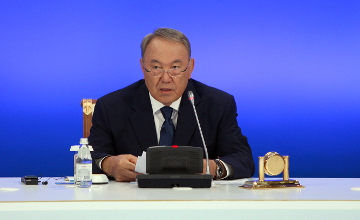ASTANA – The 28th session of the Foreign Investors Council of Kazakhstan, focusing on the development of the country’s agricultural sector, was held on June 4-5 in the Kazakh capital and chaired by President of Kazakhstan Nursultan Nazarbayev, who called on foreign investors to involve themselves in Kazakh agribusiness and said that despite economic challenges, his country continues to be an attractive investment.
“Despite the difficult external economic environment that we are observing now [and] geopolitical challenges, Kazakhstan continues to show growth and attractiveness to investors,” Nazarbayev said at the plenary session on June 4. “The choice [to discuss agribusiness development] was not accidental. Kazakhstan is the ninth largest country in the world by area that has unique agricultural resources,” he said.
Among the developments in agriculture in Kazakhstan, Nazarbayev announced that the Philip Morris Company had established an agribusiness centre in the Almaty region for the study of drip irrigation, greenhouse production, the use of fertilisers and other new technologies. Projects like this would always receive the support of the government of Kazakhstan, he said.
Nazarbayev also announced that Kazakhstan’s three large agrarian universities would be merged to create a unified agricultural research and education centre to help develop applied science, train specialist and put into practice modern technologies. “We intend to attract the best international partners to create the centre in the next five years,” the President said, according to BNews. “It will be a useful experience for the entire region and the post-Soviet space.”
The President also cited offers to launch high-quality beef production in the country and noted that the roads, railways and multi-modal transit projects underway in the country (which include the Western Europe-Western China highway project) would support the development of Kazakhstan’s agriculture in providing more ways for the landlocked country to export its products to existing markets and new markets in China, India and the Middle East.
President of the European Bank of Reconstruction and Development Suma Chakrabarti, who co-chairs the council, addressed the plenary session saying that Kazakhstan could play a key role in global food security.
“Kazakhstan can play a greater role in global food security if it creates the right conditions for companies to increase production. If companies boost productivity, improve communication with international markets and build up infrastructure, they can produce and sell much more – especially now when there is a gap in regional and international markets created by geopolitical turmoil,” he said.
Kazakhstan has made great achievements in its agricultural sector already, Chakrabarti added, particularly in wheat and flour exports. But in the context of the current economic crisis and regional turmoil, diversifying the economy, including in terms of ownership, is key – and rebalancing the economy of Kazakhstan is a shared goal under the Partnership for Re-Energising the Reform Process signed between Kazakhstan and the EBRD in May 2014.
“Change is necessary. New technologies, fresh capital and dynamic entrepreneurs need to come to the sector,” Chakrabarti said. “A promising industry like agriculture should be generating greater income for Kazakhstan and insuring it against oil price shocks.”
“But there also needs to be a strong domestic private sector to really take Kazakh agriculture to global levels,” he stressed. “Domestic agribusiness companies need to reform from within to attract international financing, including from the EBRD. These domestic companies need to become more transparent, improve their corporate governance and financial management.”
The EBRD is already working on agricultural projects in Kazakhstan, including through credit lines to agricultural companies. “Thanks to the government’s support, we are about to launch a new programme called Advice to Agribusiness,” he announced. “We are also working together to improve global market coordination in grain. Last year, the government invited us to get Kazakhstan connected to the Agriculture Market Information System, and we are working, in partnership with the [Food and Agricultural Organisation of the United Nations (FAO)], to get the country fully plugged in.”
However, he advised, to really boost agriculture exports, much more needs to be done in storage, transport and trading infrastructure.
Promoting industrial development in Kazakhstan was also on the agenda of this council session. In his remarks at the plenary session, Minister of Investment and Development of Kazakhstan Asset Issekeshev announced that Toyota plans to increase its presence in Kazakhstan, and Coca-Cola, Heidelberg Cement and other companies plan to increase production. The Japanese car maker plans to expand its presence in Kazakhstan’s market through projects at the Khorgos-Eastern Gate Special Economic Zone on the border with China, as well as make inroads in the food industry, the minister announced.
Issekeshev also discussed other industrial projects. “Kazakhstan is currently working on a couple of promising projects that are part of the country’s ambitious programme to upgrade domestic industrial sector. These include a full-cycle car manufacturing plant built together with Renault-Nissan Alliance and Avtovaz, a fertiliser manufacturing plant developed together with EuroChem, a new plant for production of pipes built by Italy’s Tenaris, and more,” he said, according to Kazinform. He also reported that he had been in talks with foreign and local companies, including Tengizchevriol, the Astana EXPO 2017 Company, Abu Dhabi Plaza and others about expanding their use of local content.
“We will continue to work with investors. We also plan to establish a chain of small and medium industrial service companies around big projects,” he said.
The council also reviewed the report on the implementation of instructions from the last session and recommendations of council working groups.
Kazakhstan’s Foreign Investors’ Council is an advisory body established in 1998 to promote direct dialogue between the government of Kazakhstan and foreign investors to address key investment issues and improve the investment climate of Kazakhstan. The council currently consists of more than 30 presidents and chief executive officers of foreign companies and international organisations and meets twice a year.

